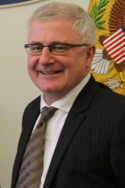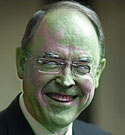Sunday morning laughs: over at his Climate Conversation Club, Richard “no warming in NZ” Treadgold fulminates about about the contents ((Interestingly, his horror is at the mundane reality of an author promising to put together a first draft of a summary for policymakers, which before publication will go through numerous drafts and which will be fought over line by line by the representatives of every government participating in the IPCC process, before being explicitly approved by them all.)) of a stolen email:
Appalling. It’s a free world, so even the “leaders” in climatology are entitled to express the opinion they like. But I draw attention to those who willingly follow these atrocious examples. Such people sabotage science, ransack reason and in the end destroy democracy. Though they imagine they do these things entirely for our own good, they must feel the heat of public opprobrium before they destroy us.
Change one word in that elegant little diatribe, and I would agree one hundred percent. The word? Climatology. Strike that through, and replace it with your word of choice for those would try to persuade us to do nothing.
It really is a looking-glass world on “the other side”: a world where the direction we know as up is called down, black appears to be white, and the laws of physics are puzzling Alice ((“When I use a word,” Humpty Dumpty said in a rather a scornful tone, “it means just what I choose it to mean — neither more nor less. Source.)).
Like this:
Like Loading...
 Tim Groser, the new Minister for Climate Change Issues, is adamant in his defence of the intention to further delay bringing the agricultural sector into the Emissions Trading Scheme beyond the current date of 2015 unless there are adequate abatement options open to them by then and unless other countries step up to the mark with mitigation measures. His remarks on Morning Report on Thursday made it clear that the interests of the overall economy were more important than mitigation of the 0.2% of the global greenhouse gas emissions that New Zealand is responsible for. He spoke of the difficulty of managing the economy through tough times.
Tim Groser, the new Minister for Climate Change Issues, is adamant in his defence of the intention to further delay bringing the agricultural sector into the Emissions Trading Scheme beyond the current date of 2015 unless there are adequate abatement options open to them by then and unless other countries step up to the mark with mitigation measures. His remarks on Morning Report on Thursday made it clear that the interests of the overall economy were more important than mitigation of the 0.2% of the global greenhouse gas emissions that New Zealand is responsible for. He spoke of the difficulty of managing the economy through tough times.
 In a comment on Tom Bennion’s recent
In a comment on Tom Bennion’s recent  The new leader of New Zealand’s far-right ACT Party — the former National Party leader,
The new leader of New Zealand’s far-right ACT Party — the former National Party leader,